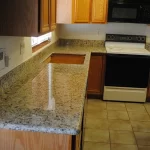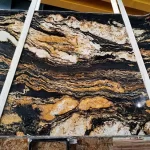Granite countertops have been a well-liked option for homeowners for a considerable amount of time due to the inherent beauty and durability of granite. On the other hand, one topic that frequently comes up is whether or not granite countertops are porous and therefore need to be sealed. For the purpose of providing a full knowledge of the porosity of granite countertops and the requirement of sealing, we shall investigate this issue from a variety of perspectives during the course of this essay.
A kind of igneous rock known as granite is mostly made up of quartz, feldspar, and several other minerals. The cooling and solidification of molten lava is the process that results in its formation deep under the crust of the Earth. Granite, as a result of the natural process by which it undergoes production, exhibits various features that can have an effect on its porosity.
Granite is regarded to be a material that has a comparatively low porosity when compared to other natural materials. Granite is characterised by its interlocking crystal structure, which results in the formation of a thick and tightly packed network of mineral grains. This network helps to limit the amount of open holes and the amount of liquids that are absorbed by the material. As a consequence of this, granite countertops have a natural resistance to the infiltration of moisture and stains.
Granite, on the other hand, is not fully impenetrable to liquids, despite the fact that it is typically less porous than other natural stones. This is crucial information to keep in mind. Granite’s porosity may be affected by a number of factors, including the individual mineral composition of the material, the existence of microfractures or veins, and the finishing treatment that is done to the surface.
There is a possibility that the porosity of granite can change from one slab to the next, and even within the same slab, there may be differences in various regions. There is a possibility that certain varieties of granite have a larger porosity than others because there are more open areas between the mineral grains. In the event that these gaps are not sealed, there is a possibility that liquids will be able to enter the surface.
Sealing granite countertops is a preventative action that can be performed to reduce the likelihood of stains and to guarantee that the countertops will last for an extended period of time. Sealants provide the function of a protective barrier by sealing in the small pores and lowering the likelihood that liquids will be absorbed into the stone. Water, oil, and other common household fluids that may normally cause discoloration or damage can be repelled by sealants, which can aid to prevent damage or discoloration.
There are a number of elements that determine whether or not granite countertops require sealing. These considerations include the particular type of granite employed, the finish that is applied, and the amount of upkeep that is wanted. There are some granite worktops that are more porous than others, and as was noted previously, these surfaces may require sealing more regularly. Furthermore, certain finishes, like as honed or leathered finishes, have a tendency to be more porous than polished surfaces, which makes sealing an even more important consideration.
A straightforward water test may be accomplished in order to ascertain whether or not your granite countertops need to be sealed. Observe the surface after a few droplets of water have been sprinkled on it and examine how it reacts. In the event that the water forms beads and stays on the surface, this is an indication that the countertop is sufficiently sealed. In the event that the water is absorbed into the stone, resulting in the formation of a darkish patch, this indicates that the sealant has worn off, and it is required to reseal the stone.
The procedure of sealing granite countertops is not a one-time repair, which is something that should be taken into consideration. Regular cleaning, exposure to heat, and general wear and tear are all factors that contribute to the progressive deterioration of sealants over time. Because of this, it is normally advised that the countertop be resealed on a regular basis in order to preserve the protective barrier and ensure that it will last for a long time.
In order to ensure that granite countertops are properly sealed, it is recommended that you seek the advice of specialists who have prior expertise in the sector. The suitable sealant to employ, the frequency of resealing, and the appropriate maintenance methods are all things that they are able to give assistance on.
In conclusion, although granite countertops are often low-porosity, it is important to note that they are not fully immune to liquid molecules. Granite may take on a variety of porosities, and certain countertops might need to be sealed in order to improve their resistance to stains and boost their longevity. In order to protect the surface and maintain the natural beauty of granite countertops, it is vital to perform routine maintenance, which includes replacing the sealant on a frequent basis. It is possible for homeowners to make educated selections and preserve the durability of their countertops if they have a thorough grasp of the porosity of granite and the advantages of sealing your worktops.










